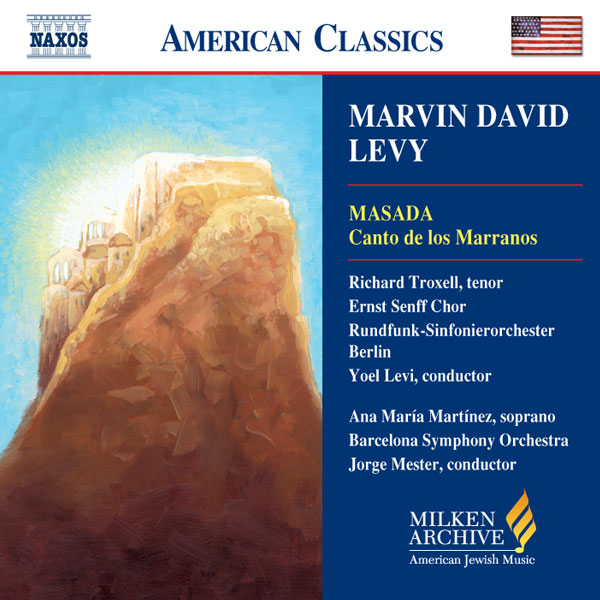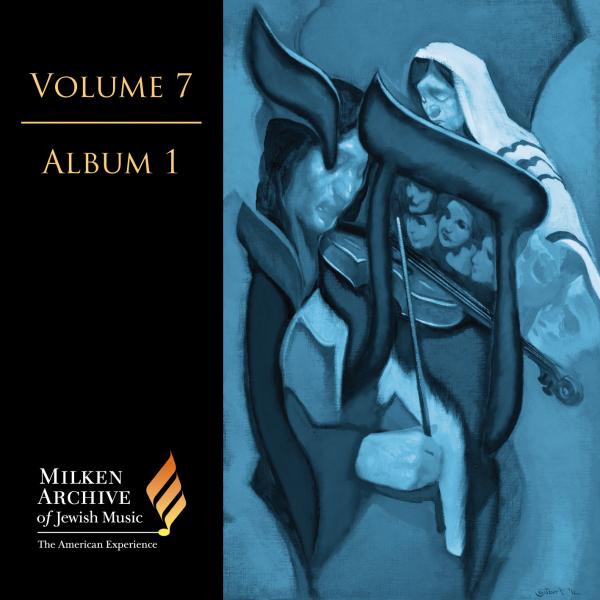Tracks
Track |
Time |
Play |
| Shiru ladonai | 04:11 | |
| Mi khamokha | 01:00 | |
| V'sham'ru | 00:52 | |
| May the Words | 05:05 | |
| Kiddush | 01:43 | |
| Adon olam | 01:37 |
Liner Notes
Shir Shel Moshe is Levy’s setting of kabbalat shabbat (welcoming the Sabbath) and Sabbath eve liturgies as a musically complete, unified service. It was commissioned by Cantor David Putterman and the Park Avenue Synagogue in New York in 1964. In 1943, Putterman had initiated a program in which he commissioned new works for the Hebrew liturgy from both firmly established and promising young composers—non-Jews as well as Jews. The fruits of those commissions received their premieres at the synagogue’s annual Friday evening Sabbath eve service of new music, which became one of the most important Jewish cultural events nationally, as well as a significant and eagerly anticipated event on New York’s annual cultural calendar. The program lasted more than thirty years and attracted contributions by some of the most prominent and soon-to-be prominent American composers.
Originally those annual new music services comprised settings of individual prayers or liturgical texts by several composers. But beginning in 1950, with Mario Castelnuovo-Tedesco’s Sacred Service for the Sabbath Eve (op. 122), Cantor Putterman commissioned full services by single composers on an annual basis. By 1964, when Putterman invited Levy to compose this service, Levy was already beginning to come to public attention because of the commission for his opera Mourning Becomes Electra. In fact, he initially declined the Park Avenue commission because his attention was already focused on that work, but typically, Putterman persisted and eventually persuaded him to accept, so that ultimately Levy worked on both at the same time. Perhaps for that reason he later described Shir Shel Moshe as “very simple...I didn’t have time to go into something more complex.” But the composer’s own characterization might be a bit deceptive, if not overly humble, since the very simplicity of which he speaks lends the work an engaging quality, free of pretension.
In his review of the work after its premiere, Erwin Jospe, an experienced composer of synagogue music and at that time dean of the School of Fine Arts and professor of Jewish music at the University of Judaism in Los Angeles, noted:
It speaks well for Mr. Levy’s honesty that he writes in the style in which he ought to, his own. He is not pretending to be somebody other than himself when he writes for the synagogue. There is nothing assumed, nothing pseudo-Jewish . . . . He simply approaches his task as a composer . . . who uses musical ideas—and he has many—to build musical structures. It is cause for rejoicing that this brilliant young American composer has written an impressive work of lasting value for the contemporary synagogue.
One of the most interesting and inventive movements is the concluding hymn, adon olam, where a quickly memorable but original tune is repeated for each strophe in a different key over a samba-type rhythm on the organ, almost giving the piece a Latin American flavor.
Lyrics
(Excerpts)
Sung in Hebrew
SHIRU LADONAI (PSALM 98)
Translation: JPS Tanakh 1999
Sing to the Lord a new song, for He has worked wonders; His right hand, His holy arm, has won Him victory.
The Lord has manifested His victory, has displayed His triumph in the sight of the nations.
He was mindful of His steadfast love and faithfulness toward the house of Israel; all the ends of the earth beheld the victory of our God.
Raise a shout to the Lord; all the earth, break into joyous songs of praise!
Sing praise to the Lord with the khinor, with the khinor and melodious song.
With ḥatzotzrot and the blast of the shofar raise a shout before the Lord, the King.
Let the sea and all within it thunder, the world and its inhabitants; let the rivers clap their hands, the mountains sing joyously together at the presence of the Lord, for He is coming to rule the earth; He will rule the world justly, and its peoples with equity.
MI KHAMOKHA
Who, among all the mighty, can be compared with You, O Lord?
Who is like You, glorious in Your holiness, awesome beyond praise, performing wonders?
When You rescued the Israelites at the Sea of Reeds, splitting the sea in front of Moses,
Your children beheld Your majestic supreme power, and exclaimed: “This is our God: The Lord will reign for all time.”
And it is further said: “Just as You delivered the people Israel from a superior earthly military power, so may You redeem all from oppression.”
Praised be You, O Lord (praised be He and praised be His name), who thus redeemed Israel. Amen.
V'SHAM'RU
The children of Israel shall keep and guard the Sabbath and observe it throughout their generations as an eternal covenant. It is a sign between Me and the children of Israel forever, that the Lord created heaven and earth in six days, and that on the seventh day He rested and was refreshed.
MAY THE WORDS
Sung in English
May the words of my mouth and the meditation of my heart be acceptable unto You O Lord, my Rock and my Redeemer.
Thou who establishes peace in the heavens, grant peace unto us and to all of Israel. Amen.
KIDDUSH
Praised be You, Lord (praised be He and praised be His name), our God, King of the universe, who has created the fruit of the vine. Amen.
Praised be You, O Lord (praised be He and praised be His name), our God, King of the universe, who has sanctified us through His commandments and has taken delight in us. Out of love and with favor You have given us the Holy Sabbath as a heritage, in remembrance of Your creation. For that first of our sacred days recalls our exodus and liberation from Egypt.
You chose us from among all Your peoples, and in Your love and favor made us holy by giving us the Holy Sabbath as a joyous heritage.
Praised are You, O Lord (praised be He and praised be His name), our God, who hallows the Sabbath. Amen.
ADON OLAM
Lord of the world, who reigned even before form was created,
At the time when His will brought everything into existence,
Then His name was proclaimed King.
And even should existence itself come to an end,
He, the Awesome One, would still reign alone.
He was, He is, He shall always remain in splendor throughout eternity.
He is “One”—there is no second or other to be compared with Him.
He is without beginning and without end;
All power and dominion are His.
He is my God and my ever living Redeemer,
And the Rock upon whom I rely in time of distress and sorrow.
He is my banner and my refuge,
The “portion in my cup”—my cup of life
Whenever I call to Him.
I entrust my spirit unto His hand,
As I go to sleep and as I awake;
And my body will remain with my spirit.
The Lord is with me: I fear not.
Credits
Composer: Marvin LevyPerformers: BBC Singers; Christopher Bowers-Broadbent, Organ; Kenneth Kiesler, Conductor; Vale Rideout, Tenor
Publisher: Boosey & Hawkes
Translation from the Hebrew by Rabbi Morton M. Leifman


